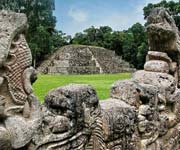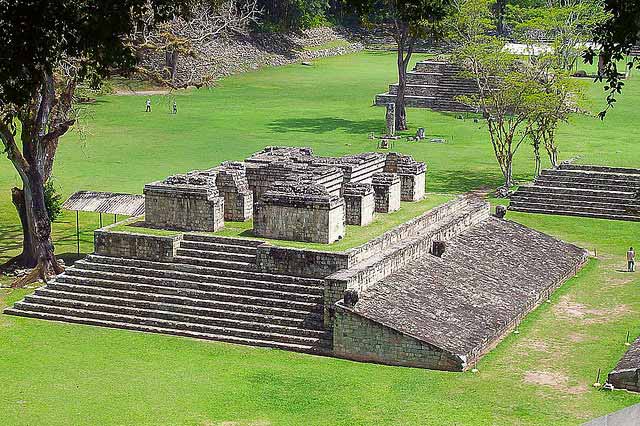Maya Site of Copan Honduras
Maya Site of Copan, Honduras, was discovered in 1570 by Diego Garcia de Palacio, the ruins of Copán, one of the most important sites of the Mayan civilization was not excavated until the 19th century. The ruined citadel and imposing public squares reveal the three main stages of development before the city was abandoned in the early 10th century. Copán with its temples, plazas and terraces, comprises a type of architectural complex among the most characteristic of the Mayan civilization. The lengthy inscription on the Hieroglyphic Stairway Plaza is of considerable historical significance.
Cultural Developments

Architectural activity, as well, made strides during this period. The site of Copán went through three principal stages of development during which evolved the temples, plazas, altar complexes and ball courts that can be seen today. Shortly after 900, the site was abandoned. Although Copán was discovered in 1570 by Diego Garcia de Palacio, its existence did not receive worldwide attention until the work of John Lloyd Stephens from 1839 to 1841. Since then, numerous archaeological expeditions have explored and excavated various parts of the site.

Outstanding structures of Mayan culture
The Mayan city of Copán as it exists today is composed of a main complex of ruins with several secondary complexes encircling it. The main complex consists of the Acropolis and important plazas. Among the five plazas are the Ceremonial Plaza, with an impressive stadium opening onto a mound with numerous richly sculptured monoliths and altars; the Hieroglyphic Stairway Plaza, with a monumental stairway at its eastern end that is one of the outstanding structures of Mayan culture. On the risers of this 100 m wide stairway are more than 1,800 individual glyphs which constitute the longest known Mayan inscription. The Easter Plaza raises a considerable height above the valley floor. On its western side is a stairway sculptured with figures of jaguars originally inlaid with black obsidian.
Browse All UNESCO World Heritage Sites in India.

Terraces and Temples
The sculpture of Copán appears to have attained a high degree of perfection. The Acropolis, a magnificent architectural complex, appears today as a large mass of rubble which came about through successive additions of pyramids, terraces and temples. The world's largest archaeological cut runs through the Acropolis. In the walls of the cut, it is possible to distinguish floor levels of previous plazas and covered water outlets.
During the period when Mayan civilization spread across Central America, Copán was the largest and most influential city in the south-eastern sector. Copán remains endangered by continued erosion of the river, microflora; and the outlying complexes, by continued agricultural practices. The site is a seismic zone and had suffered damage from at least two earthquakes. Further, the natural surroundings of the area are being threatened by the infringement of the neighbouring town of Copán Ruins. Source
Want to read UNESCO Daily News Updates? Click Here!!!


